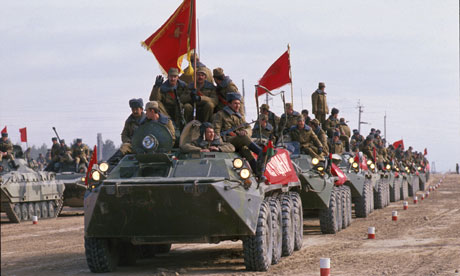
This is the book that every politician, every general, every diplomat contemplating getting into, or out of, Afghanistan should be made to read. It is a book that we should have had 10 years ago, and need more than ever today. It is a minor masterpiece.
Sir Rodric Braithwaite has produced what will become the definitive account in English of the Soviet experience in Afghanistan, from the time in autumn 1979 that the gerontocrats in the politburo reluctantly agreed to accede to Afghan requests to intervene, against the Russians' better judgment, to Gorbachev's decision to staunch the "bleeding wound" and withdraw nearly 10 years later.
Braithwaite brings to the task a deep knowledge and love of Russia: its language, its people, and its wounded soul. Beyond that he makes good use of his understanding of international affairs, from more than three decades as a diplomat, ending as ambassador to Moscow and foreign policy adviser to prime minister John Major. He is an historian of distinction and rigour. And he writes with great fluency, in an easy style that makes one want to read on and on.
What comes across most strongly, however, is his humanity. In every chapter, we feel his sympathy for the suffering that the intervention brought for tens of thousands of Soviet citizens, and for scores of thousands of wretched Afghans. Yet, as Braithwaite points out in his epilogue, for all the agonies that the Afghanistan episode brought a dying Soviet Union, it was, in Soviet terms, a relatively small war. And Russia has managed, more or less, to bind its wounds and move on.
For the Afghans, the suffering continues to this day. For them, the departure northwards of the last Soviet soldier over the Friendship Bridge across the Oxus river was the start of two decades of unending, and unfinished, turmoil. As Braithwaite suggests, in the end, the Soviet Union, having thrashed around in the quagmire with great violence, found the only sensible way to extract itself: a political approach, in which the Afghan leaders were instructed to forget communism, abandon their attempts to impose socialism, embrace Islam, and work with the tribes. They left behind a regime which, contrary to expectation, not only survived, but defeated the insurgents then being supported by the US, Britain, Saudi Arabia and others, as well as Pakistan. That government collapsed only when the Soviet Union collapsed, and Gorbachev's successor, Boris Yeltsin, decided to end all Russian aid, in money and kind, to Afghanistan.
Every reader will learn his own lessons from this book: about why the Soviet Union went in, and why so many in the Soviet system, including some brave generals, warned of the folly of doing so; about the good intentions that paved the Soviet road to Helmand, in trying to modernise a society that was, at least in the rural areas, very reluctant to be modernised; about the mistakes of strategy and tactics the Red Army made, in seeking to pacify (or, in today's language, stabilise) vast areas of the country that they could "clear", but never "hold"; about the savagery and corruption that infected the Soviet war machine, and which was reciprocated by their opponents. There are lessons, too, about the Afghans' lack of capacity and will to secure and govern their own country in the ways their foreign friends had hoped; about the love that , despite everything, many Soviet experts and advisers developed for the Afghan lands and peoples, and their astonishing history and culture. And about the poetry and prose and music that this war inspired.
When I arrived in Kabul as British ambassador in 2007, the Russian ambassador, Mr Kabulov, used to joke that he had been there so long the city had been named after him. Like so many of his countrymen, he seemed torn between not wanting the west to fail in Afghanistan (leaving the country to plunge back into chaos and civil war) and not wanting America and Nato to enjoy success where Russia had failed. "I have a very warm feeling towards you," he would tease: "I see you making all the same mistakes as we did."
Braithwaite's book suggests that that isn't, actually, the whole truth. Wisely, he allows the parallels with other interventions, before or since, to speak largely for themselves. For all the obvious links, there are plenty of important differences with Britain's attempts to intervene in the 19th century, and with the present western engagement there.
I finished this book on the day the House of Commons Foreign Affairs Committee produced a report recommending that Britain try to persuade the US to adopt a more political approach to Afghanistan, of the kind the Soviet Union eventually took. That only added to the overwhelming sense of sadness with which I put down this masterly account of the whole unnecessary tragedy of Soviet Russia's attempt to remake Afghanistan in its own image.
Of course, the book is not perfect. I spotted a few misprints, and other minor mistakes, which proper sub‑editing should have suppressed. But they can be corrected in the future editions Braithwaite's book surely deserves.
And for those who need cheering up after reading Afgantsy, the British Museum has just produced the perfect pick-me-up: "Afghanistan: Crossroads of the Ancient World", an astonishing exhibition of the Bactrian gold and much more. I cannot recommend it, or this book, too highly.
Sherard Cowper-Coles's account of his time as British ambassador to Afghanistan, Cables from Kabul, will be published by HarperPress.

